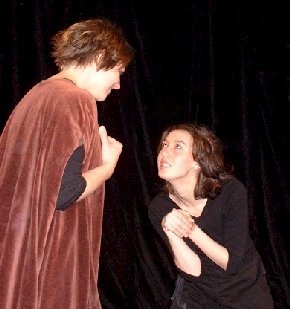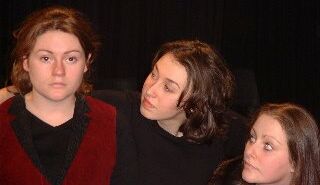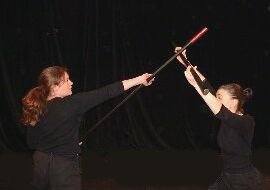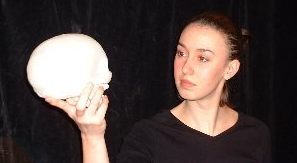
|
The
play was adapted by Marcus D. Gregio "When
you reach the point of playing Hamlet, threading his way through his
intricate psychology to the moment when he kills the King, will it
be important to you to have a life-size sword in your hand? If you
lack one, will you be unable to finish the performance? You can kill
the King without a sword, and you can light a fire without a match.
What needs to burn is your imagination." |
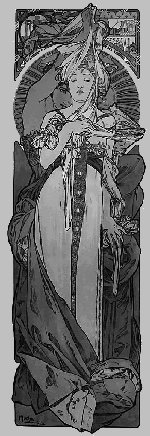 |
No,
to sleep, to dream. Ay. For in that dream of death, when we awake, And borne before an everlasting judge, From whence no passenger ever returned, The undiscovered country, at whose sight The happy smile, and the accursed damned, But for this, the joyful hope of this. Who'ld bear the scorns and flattery of the world, Scorned by the right rich, the rich cursed of the poor? The widow being oppressed, the orphan wronged, The taste of hunger, the tyrant's reign, And thousand more calamities besides. To grunt and sweat under this weary life, When that he may his full quietus make With a bare bodkin, who would this endure, But for a hope of something after death? Which puzzles the brain, and doth confound the sense Which makes us rather bear those evils we have Than fly to others that we know not of. Ay that. O, this conscience makes cowards of us all. |
THE CAST (order of speaking)
| HAMLET | Sally Russell |
| GHOST | Kate Pettit |
| CLAUDIUS | Kate Pettit |
| GERTRUDE | Cherry Franklin |
| POLONIUS | Lee Ann Zahrt |
| OPHELIA | Cherry Franklin |
| ROSENCRANTZ | Lindsey Bender |
| GUILDENSTERN | Juliet Jones |
| LAERTES | Lindsey Bender |
| HORATIO | Juliet Jones |
| GRAVEDIGGER | Lee Ann Zahrt |
| OSRIC | Lee Ann Zahrt |
PRODUCTION
Directed by Marcus
D. Gregio
Assistant to the director: Maximilian D. Gregio
Casting Assistants: Ros Wehner Christopher Clark
School of Drama
& Music Support Staff
Administrative Assistant: Gayatri Simons
Technical Manager: Jon Primrose
Technical Assistant: Chris Mearing
Wardrobe Assistant: Anthea Nakorn
Acknowledgments
Patricia Lane-Mullins
Graham and Carol, porters at the School of Drama & Music
Chris Main, British Academy of Stage & Screen Combat
Stephen Whyte at Clydesdale House
|
Hamlet
Expectations All people, in some form, find comfort in routine--in habits they have allowed to exist whether in subconscious or conscious form. Security blankets are often needed in order to function from day-to-day. In theatre, that lack of variety can be stifling. Truly, if the only reason to see a particular play is to see something that one expects, theatre is dead before it begins. On that line, different for the sake of being different does not automatically create living theatre. At its best, theatre is just that... a living art; an art happening in the now. It does not live by virtue of a live performance alone, but lives in its ability to create the basis for the reflection of life (not solely to reflect or react to art as it exists in the world). HAMLET, as a play, and Hamlet as a character, has become one of the enigmas of Western theatre. HAMLET epitomises all that can be exciting about theatre, but it also epitomises all that prevents the general public from experiencing good, living theatre. The latter is the stereotype of Hamlet as a character that talks to a skull and utters "to be or not to be". There are, in fact, three different and separate texts of HAMLET that are attributed to William Shakespeare. The version that modern theatregoers are usually exposed to is based on a published folio form from 1623. The folio, that contains most of the texts attributed to William Shakespeare, was published long after The Bard's death. Of the two quarto versions, the first was published around 1603 while the second was published about 1604. The only version of the play that was actually performed, to our knowledge, during Shakespeare's life, was the version published in 1603. Interestingly, that 1603 Quarto does not contain the words "to be, or not to be, that is the question". I also add, and stress, that all versions of HAMLET that one sees are adaptations of the performance script. Again, that performance script is generally based on a version of the play that was published seven years after Shakespeare's death and never produced during his lifetime. A play generally ran about two hours at Shakespeare's Globe Playhouse. Even if actors spoke at the rapid pace that they are presumed to have spoken in the Early Modern Period, the version of HAMLET that we often are exposed to would not fit into that time frame. HAMLET has become an enigma because we have allowed the permeation of that mystery to infect the way we look at the play. It is that security blanket of misinformation that we have to dispense with or else we will forever be performing a dead play from a dead playwright. The past should only be applied to our theatre when it has the value of application to a living piece of art. Shakespeare's HAMLET was first performed (scholars cannot agree), at my guess, in 1602 making this year the 400th anniversary of the play. It is time to break some Hamlet Conventions. One old convention, that will be kept, however, is the sense of lighting. The plays of Shakespeare's day were often done in the open air. There is a fundamental difference between plays and movies beyond the obvious ones of creative types. When we sit in the dark, watching a film, we have a solo experience; the movie becomes an experience of screen and single viewer. Theatre should be a communal experience, however, one that is shared by all and that enhances all by living and reacting to each element on stage and around the stage. It is that sharing of experience that helps to make theatre alive. Still, this play is not being performed to a fully-lit house for the sake of re-creation. The act of re-creation for the sake of faux duplication is death (and those who have the desire for this kind of re-creation should fall upon the same fate as those who choose to move Shakespeare's bones). More accurately, it is not a curse to re-create what has gone before... it is just death. And while death is certainly a huge element in HAMLET, we should not condemn ourselves into a tomb of history for the sake of proposed accuracy to a time period or to a text. I encourage you to create yourself anew; cast away those preconceived notions of what you think HAMLET is about, and see this play in a fresh way. Only then, will you be able to take the journey--from a living point of view--that we will offer to you tonight. Marcus
D. Gregio |
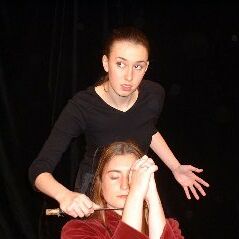 Now might I kill him, now he is praying
|

